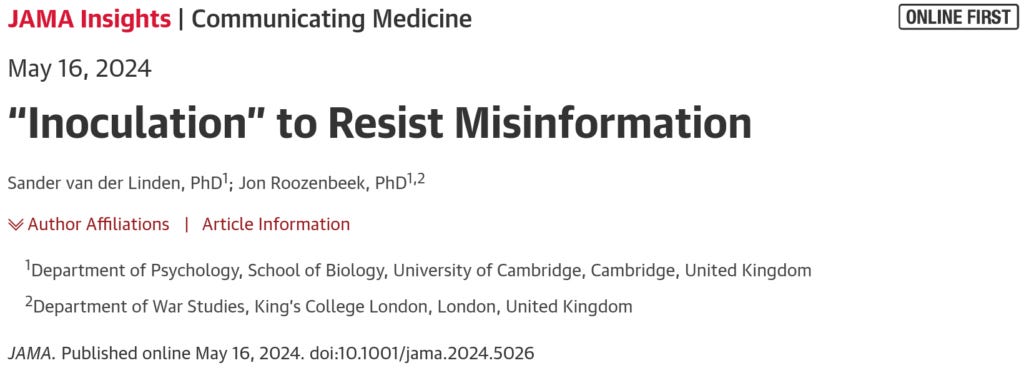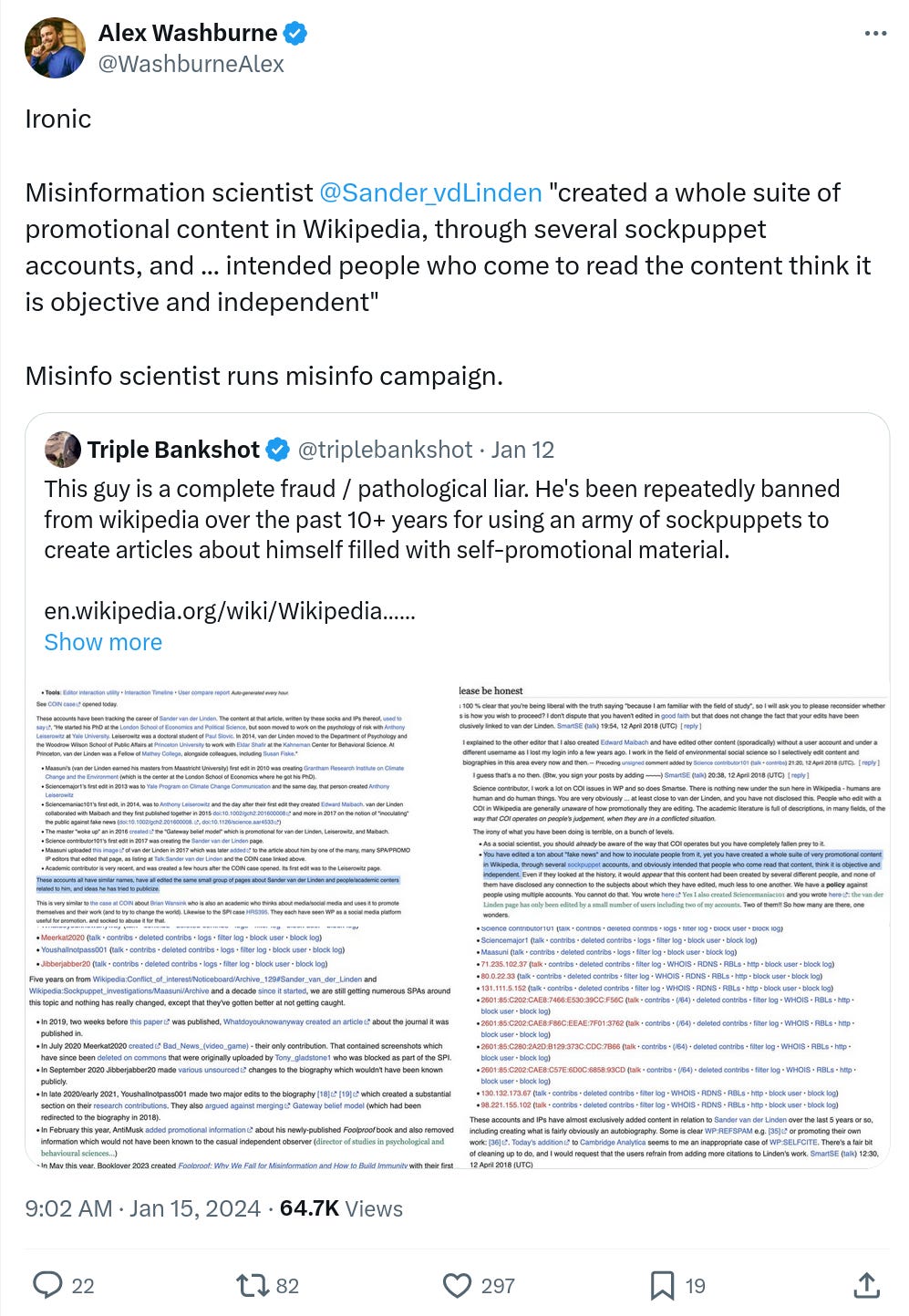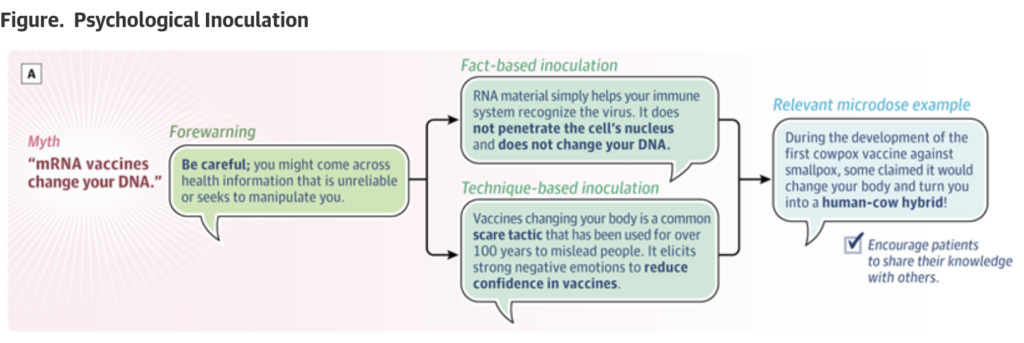Academia and the new dark age: Part 8 - Why the "misinformation experts" won't, and can't, stop spreading misinformation
"Misinformation experts" are deeply unserious people whose domain of "expertise" is completely bogus. Why won't they stop?
Last week's post, The doctor will propagandise you about vaccines now, generated some very lively discussion in the Substack comments section. Here's one that summed up the general sentiment:
Well,
, I'm sorry to break it to you but these ridiculous people do not understand - or perhaps more to the point, they will not understand - how their creepy, desperate, jab-in-every-arm-psyop has turned a significant proportion of the population into permanent vaccine refuseniks. And they're hell-bent on pushing ever more jabs on everyone, everywhere, all the time.As proof, JAMA (which, I'll remind you, is one of the world's top-ranking medical journals, despite being little more than a repeater station for woke propaganda), recently published an article titled ‘“Inoculation” to Resist Misinformation’. This glorified opinion piece is such a dumpster fire that I hardly know where to begin, so let's begin with the authors, Sander van der Linden and Jon Roozenbeek.
You'll notice from the screen grab below that Roozenbeek divides his time between the psychology department of the University of Cambridge and the Department of War Studies at King's College London. Department of War Studies, huh? What's a psychologist doing there? Oh yeah, that's right: during World War II, the British developed the ancient art of psychological warfare to become - as one of the chief architects of the psywar campaign, Richard Crossman, wrote - "the only aspect of war at which [they] achieved real pre-eminence."
As for Sander van der Linden, the top-notch investigative journalist (and former US Senate investigator)
published a scathing piece on this academic ass clown......which "exposed [him] as a liar and a quack who spreads misinformation while editing his personal Wikipedia page for the last decade through various single purpose accounts (SPAs) or sock puppets, to burnish his credentials and promote himself and his research."
Well, that's impressive. Let's see if the piece that this pair of prevaricating pedagogues penned, lives up (or down) to the expectations one might have upon discovering their backgrounds.
The opening sentence gets us off to a great start:
"The global spread of false and misleading information poses serious threats to public health by promoting vaccine hesitancy, non–evidence-based therapies (eg, 'natural' remedies), and even the refusal of life-saving medical treatment such as monoclonal antibodies.1,2"
Yeah, the major "threat to public health" is not that "795 000 Americans become permanently disabled or die annually across care settings because dangerous diseases are misdiagnosed" by doctors trained in "evidence-based" therapies, or that billions of people across the world were persuaded, cajoled, bribed and coerced to take experimental medical products that caused one in 800 clinical trial participants to suffer a serious adverse event of special interest.
No, the "serious threat to public health" that we should all be paying rapt attention to, is that more and more people are discovering that the endlessly-repeated claims that vaccines are one of the greatest ever achievements of public health, and have saved many millions of lives are a house of cards, and that these people are increasingly opting for highly effective, relatively inexpensive treatments with a long history of safe use, over costly, patented products with an as-yet unknown long-term safety profile.
Wait, it gets even better. The authors assert that "debunking science-related misinformation was, on average, unsuccessful in reducing misperceptions". The meta-analysis that they cite to support this argument (which Roozenbeek and van der Linden peer reviewed) included studies that attempted to persuade participants that there is no evidence that any vaccines are causally related to autism (despite the facts laid out in last week's post), and that they should support economically destructive "climate" policies because weather is different from climate.
Rather than drawing the conclusion that participants in these studies aren't all stupid enough to fall for researchers' cheap tricks, and maybe those researchers should choose a more useful career, Roozenbeek and van der Linden propose that propagandists misinformation specialists should be "psychologically inoculating" the stupid rubes who won't do as they're told members of the public who need to be protected from dangerous misinformation, using their super-duper prebunking technique. Because "misinformation" is totally like... a deadly virus spreading from person to person, and their genius technique is totally like... a life-saving, Safe and Effective™ vaccine... and this tortured analogy is totally not lame:
"Psychological inoculation exposes people to a severely weakened dose of misinformation or the techniques used to produce misinformation—and subsequently refutes that misinformation in advance (ie, the prebunk)—to build up psychological resistance against future exposure to the 'full dose' of misinformation.2,3,5 The approach is thus analogous to medical vaccination; just as the body benefits from being exposed to low doses of an attenuated virus to generate an effective immune response, research finds that it works the same way with the mind. That is, people benefit from exposure to microdoses of information designed to mislead along with practical tips on how to spot it in order to develop cognitive resistance against misinformation...
The inoculation process consists of 2 components: (1) a forewarning (ie, people are advised that they may be manipulated by false information) and (2) the prebunk or preemptive refutation. The prebunk raises and refutes future falsehoods in weakened form, using a brief example of misinformation that is sufficient to elicit an attitudinal response but incorporating weak elements not likely to actually persuade anyone. The goal is to raise eyebrows (antibodies) without convincing (infecting). This process could be considered as building the motivation to want to defend oneself from misinformation as well as providing the skills to actually do so."
So, is this forewarning-followed-by-preemptive-refutation bizzo like the time when the Aspen Institute invited media outlets, social media companies, and national security reporters to a tabletop exercise simulating "a hypothetical, October 2020, release of records related to Hunter Biden"... and then Federal law enforcement agencies told social media executives including Twitter's former Head of Trust & Safety, Yoel Roth, that they expected some kind of hack-and-leak operation by state actors in the period shortly before the 2020 Presidential election, likely in October... and then the New York Post broke the sensational story of the Hunter Biden 'laptop from hell' on 14 October 2020 but almost all media outlets and social media companies denied or suppressed the story, and more than 50 former intelligence officials signed a letter saying the leaked emails detailing appalling corruption and influence peddling and the sordid photos of Hunter Biden smoking crack and performing sex acts with prostitutes had "all the classic earmarks of a Russian information operation", and the 'fact checking' Poynter Institute said the story wasn't credible because all the right people said it wasn't... and then one by one they admitted that the laptop was in fact genuine and they were wrong to vilify and suppress the New York Post's reporting? Or do Roozenbeek and van der Linden have a totally different idea about how their forewarning and prebunking strategy is supposed to help combat the deadly scourge of "misinformation"?
Here's a clue: their example of how to use the "psychological inoculation" technique on vaccine misinformation contains blatant misinformation. Huh.
But the modified RNA material in the Pfizer and Moderna injections does not "simply help your immune system recognize the virus". It transfects (i.e. transfers foreign genetic material into) your own body's cells, hijacking the protein-making apparatus of these cells to force them to make the most pathogenic part of this virus - the spike protein. And since this spike protein does indeed translocate into the nucleus in SARS-CoV-2-infected cells, it's a near certainty that spike protein generated after a COVID mRNA injection does indeed "penetrate the cell's nucleus". Furthermore, the mRNA injections are extensively contaminated with plasmid DNA from the bacteria used to synthesise the mRNA, and there are at least five features of these injections which promote the integration of foreign DNA into the nucleus of your cells, thus changing your DNA. Facts, schmacts.
(Fun fact: the "inoculation theory" was developed by social psychologist William McGuire in the 1960s, in response to the US government's rising concern "about the prospect of its troops becoming brainwashed [or persuaded] by foreign propaganda." Because how can you run an illegal, immoral war if your cannon fodder soldiers stop believing their government's BS and refuse to napalm any more gooks?)
OK, so "misinformation experts" spread misinformation. Most of my readers are already aware of this fact, having been subjected to an avalanche of officially-sanctioned mis- and disinformation throughout the manufactured COVID crisis (which has morphed into the omnicrisis in which Something Terrible That Is The Most Important Thing Ever is happening everywhere, all the time). So what? Why should I spend time writing about this, and why should you bother to read it?
Because, as I wrote in The WHO thinks there’s a ‘vaccine crisis’ – and that’s good news, the vaccine-industrial complex is deeply concerned that scepticism about their products is growing. Say what you will about the increasingly vicious germ theory vs terrain theory debate (which I personally view as a false dichotomy, for reasons that I've discussed here and here, not to mention a wasteful diversion of energy that would be better spent fighting our real adversary), the mere fact that a handful of doctors with large followings have called into question the very existence of infectious organisms and contagious illness, has caused many people to question the notion that we can solve complex problems of human ill-health with magic bullet solutions.
As much as I hate the idea of taxpayers' money being squandered on research grants that spawn ridiculous nonsense like the "research" discussed in this article, it's actually very heartening to realise that they/them/those are spending all that money because they're scared of us. Every person who declines a vaccine for themselves, their child or even their pet, is not just a financial loss for the vaccine-industrial complex. They're an indicator that the sophisticated psychological warfare that has been deployed on us, doesn't work on everyone.
And that's crucial, because when even one person says "No, I won't, and you can't make me even if you threaten and punish me", those around them start to entertain ideas that might never have occurred to them before: That it is possible to say no. That maybe there are valid reasons to say no. That maybe their most deeply-held beliefs aren't as unassailable as they thought. When even one person in the crowd shouts, "I see through the magician's trick!" they break the spell - even if much of the crowd still wants to be mesmerised.
As I wrote in The WHO thinks there’s a ‘vaccine crisis’ – and that’s good news,
"The vaccine industrial complex Goliath lives in such terror of the stones hurled at it by 'antivaxx' David that it devotes considerable resources to developing strategies to deflect them.
Why? Because Goliath needs our consent. Rounding up non-compliers and force-vaccinating them at gunpoint is (perhaps) technically feasible, but costly in both financial and trust capital. Nation states that claim to operate on democratic principles must use soft power to achieve domestic policy objectives, or risk electoral backlash.
And that means that we the people hold more power than we realise."
The WHO thinks there’s a ‘vaccine crisis’ – and that’s good news
You have more power than you realise. Saying no - politely but firmly - to medical interventions that, after consulting a diverse array of sources, you decide you don't want to have, is a powerful act. When you stand your ground, you empower others to do the same.
Many of you have had the experience of being quietly told by people who were initially persuaded by the military-grade psychological warfare operation to take one or more of the transfection agents, "You were right. I regret this." Embrace them. Don't be too arrogant about your own ability to see through the magician's trick; you've been fooled before by other tricks, and no doubt you'll be fooled again at some point.
Perhaps most importantly, vigorously defend the right of other people to speak, even if you disagree with what they say. The current full-court press for complete government control of "misinformation" is without doubt a top-down agenda, but it has been facilitated by the general public's increasing intolerance of those with a different point of view. That goes for all you "no virus" people, by the way - many (but by no means all) of you are among the most intolerant individuals I have ever encountered. (And I still defend your absolute right to express your views and argue your case!)
And finally, I repeat the urgent request that I made at the end of The WHO thinks there’s a ‘vaccine crisis’ – and that’s good news: please set aside 30 minutes of your life to read Eric Frank Russell’s short story, And Then There Were None. If there was ever a work of fiction with the power to change society for the better, this is it.










The ones pointing and blaming are guilty. It's a sick messed up world we live in where the goal is confusion and believing things that make zero sense.
Thank you Robyn for the link to And Then There Were None. That was literally the most fun I’ve had reading in a very long time. If only people realized how much power there is in saying, “I won’t.”